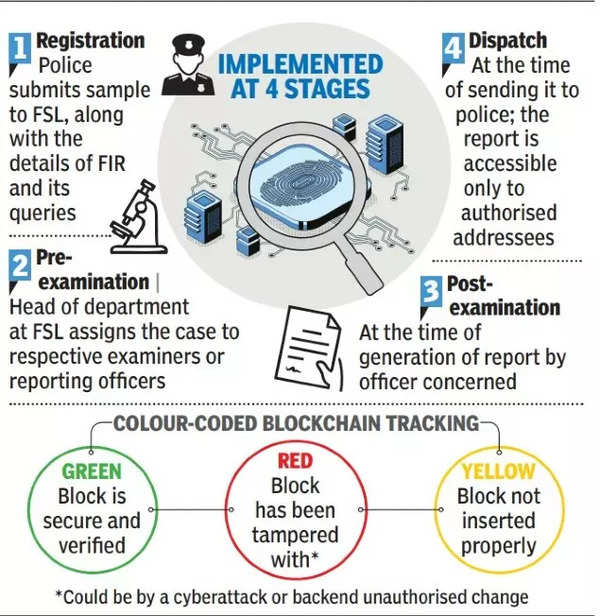[ad_1]
Officials said that blockchain would ensure immutability of records, lend reliability of digital evidence and provide effective audit trail capabilities. Blockchain, also referred to as distributed ledger technology, makes the history of any digital asset unalterable and transparent through the use of decentralisation and cryptographic hashing. The new system will also protect the FSL data from hacking, officials added.
Incorporating new technology is fundamental to improved forensic science. In this case, introducing a blockchain system will help prevent possible tampering of evidence, a previously-noticed flaw in the system. The technology must be put into practice as soon as possible. Forensic labs in other statesshould also follow suit.
IT department officials said the technology would soon be introduced in securing data of various certificates such as caste, domicile and character issued by the revenue department and afforestation records.
Officials said the investigating agencies of other states could also upgrade the Crime and Criminal Tracking Network and System (CCTNS) to use it. Traditionally, said officials, the data of the evidence collected by the investigating agency from the crime scene is uploaded to CCTNS and the exhibits are then sent from the police station to FSL. The evidence is placed in a box on top of which the details of the case and a physical seal are placed. The head of the division at FSL assigns the case to a reporting officer, tests are conducted and the report is generated.

“There is scope at several levels for tampering with the evidence. In this entire chain of custody, blockchain interventions have been implemented at four stages — when the samples, along with the copy of the FIR and the queries, are received, when the case is assigned to an investigator at FSL, during finalising the report, and when it is despatched,” said an official.
“To make a change at any stage, one cannot alter the existing record, and a new block will have to be created and a new QR code will be generated. If there is any attempt to tamper with the record, immediate alerts will go to all authorised persons,” said another official.
The Delhi FSL receives about 1,500 samples in a month. Officials said the investigators at FSL and police personnel up to the assistant commissioner level had been trained to use the new technology.
According to IT officials, the use of technology for smart policing and strengthening the criminal justice system was stressed upon by Union home minister Amit Shah at All India Police Science Congress in Bhopal last April. The IT department started working on bringing the technology in the e-FSL system in September. “Technology will act as multipliers to bring efficiency and ensure transparency and objectivity in the working of the department,” Delhi chief secretary Naresh Kumar said.
Officials said until recently, police, FSL and courts operated their respective IT-based systems in silos, resulting in limited capabilities to share data with each other that made it difficult to track and trace the cases. With the introduction of Interoperable Criminal Justice System and integration of CCTNS with e-Court, e-Prison, e-Forensics, and e-Prosecution, the data exchange has become easier. “The timestamps and encrypted data in blockchain will ensure that each block is added sequentially to a chain,” the official added.
[ad_2]
Source link


